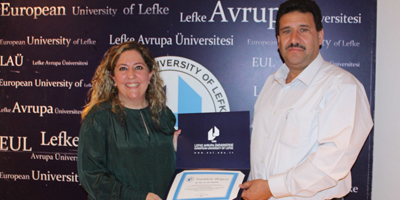“Changes and Continuity in the Middle East after the Arab Spring” discussed at EUL

In the conference organized by European University of Lefke (EUL) Faculty of Economics and Administrative Sciences Department of International Relations, “Changes and Continuity in the Middle East after the Arab Spring” was discussed. Head of Near East University Faculty of Economics and Administrative Sciences Department of Political Sciences Assoc. Prof. Dr. Nur Köprülü attended the conference as a speaker.
Köprülü: In order to evaluate the processes of political change in the Middle East, there is a need to create a new academic perspective.
Giving information about the social movements and political transformation processes in the region after the Arab Spring, Köprülü said that, “In order to evaluate the processes of political change in the Middle East, there is a need to create a new academic perspective that will go beyond the mainstream approaches, which are democratization and authoritarian flexibility debates”. Köprülü pointed out that, although the emergence of the Arab Revolt in Tunisia in 2011 was mainly due to internal causes; as a result of the direct involvement of the foreign actors in these riots and regional politics after the events, the direction and functioning of the social movements in this region has changed, especially in the case of Libya.
Köprülü said that, “From the historical perspective of democracy and democratization in Middle Eastern studies; it involves Orientalism, which represents the main stream of the debate on political change in the region and reduces the cultural authenticity, and creates alternative approaches that criticize this argument” and added that, Economic problems and unemployment in the 1970s and 1980s led Arab regimes to take steps towards political liberalization. Pointing out that, in this way, concepts such as democratization and political liberalism started to occupy an important place in the Middle East studies, Köprülü said that, “These studies have advanced in the 1980s and 1990s on how and to what extent Arab countries in the region have tried to transition from authoritarian to democratization processes, and in the 2000s, the theoretical debates on democracy were replaced by controversies such as the flexibility of authoritarian structures the continuity of authoritarianism ’.
Köprülü stated that, after the civil movements in the Middle East region after the 2011 Arab Revolt and the rising opposition, political change processes have been conducted against the leaders in the regimes governed by the republic in countries such as Tunisia and Egypt and emphasized that the monarchy governed countries such as Jordan and Morocco maintained their position and continuity through the measures and constitutional arrangements adopted after the uprisings against the regimes. Köprülü also underlined that, it is possible to see with the examples that the popular movements affecting the Arab world accelerate the process of constitution making and writing in the region as well as the reform steps.
Köprülü said that, “The example of Tunisia after the Arab Spring demonstrates that, in contrast to countries such as Syria, Iraq, and Lebanon, sectarian conflicts, radical Islamic groups and tribal devotion cannot block democracy”, and added that al-Nahda example proves that Islam and democracy can be associated.
As a result of her observations on the ODKA region after the Arab Revolt, Köprülü said that, “In this geography where democratic political instruments are weakly institutionalized, authoritarian flexibility or persistence of authoritarian regimes and sectarian divisions make the region fragile and threaten the ongoing democratization processes. Within this framework, there is a need for a constructive ground where the culture of democracy and political consensus will grow”.
